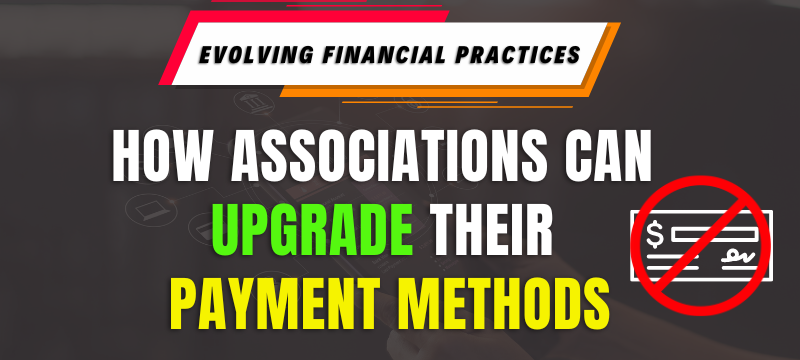Discover for yourself what our Virtual CFO (VCFO) clients already know. Here are four reasons…

Evolving Financial Practices: How Associations Can Upgrade Their Payment Methods
As many of you know, OTUS Financial Solutions specializes in comprehensive financial solutions tailored for non-profits and associations. Each year, we conduct the OTUS Association Exchange survey to gain insights into industry operations, sharing the results with our community. This year, while working on the survey, we noticed a surprising trend: more than 50% of associations surveyed still rely on paper cheques as a payment method. This observation led us to think it’s the perfect time to revisit and discuss the various payment options available to associations. Let’s explore the pros and cons of traditional and modern payment methods and how they fit into the dynamic world of association management.
Paper Cheques – The Traditional yet Challenging Approach
Paper cheques have long been a staple in the financial workings of many associations and non-profits. They offer a tangible audit trail and a sense of familiarity and security. However, the traditional method comes with significant challenges.
The need for dual signatures, a common requirement in non-profit financial governance to ensure security, adds to the complexity. In an age where team members or board members may be spread across different locations, coordinating these signatures becomes a logistical challenge, especially with the rise of remote working due to COVID-19.
Picture this: A bookkeeper in Ottawa prepares a cheque and obtains a signature from the Executive Director in the office. Then, the cheque needs to be sent across the country to a Board member in British Columbia for a second signature. Once signed, it’s mailed back to the Ottawa office for final dispatch to the vendor. This extensive process can severely impact an organization’s efficiency and cash flow.
How much time and effort has been wasted on this?
Paper cheques also carry risks of loss, theft, and environmental impact, considering their paper and ink usage. Their administrative handling, storage, and reconciliation require considerable time and resources, particularly for organizations with a large volume of transactions.
In a digital era, the effectiveness and relevance of paper cheques are increasingly under scrutiny. While they may still hold a place in some organizations for their familiarity and physical record, they often fall short in terms of modern efficiency and adaptability. It’s vital for associations and non-profits to consider if traditional payment methods like paper cheques align with their operational objectives and the need for streamlined, contemporary financial management.
Electronic Funds Transfer (EFT) – A Step Towards Modernization
Electronic Funds Transfer (EFT) offers several advantages that are especially relevant for associations and non-profits in today’s digital age. It significantly speeds up transactions compared to traditional cheques, providing much-needed operational efficiency. The process also enhances security, reducing the risks associated with handling physical cheques. Moreover, EFT tends to be cost-effective due to lower processing fees and helps cut down paper usage, aligning with sustainable practices. Its capability for remote management is a boon for modern, possibly dispersed, teams.
Challenges of EFT – A Real-World Scenario:
Despite its benefits, EFT comes with challenges. A typical scenario could involve an association’s bookkeeper preparing a payment in Ottawa, only for it to be manually re-entered into the bank’s EFT system – a tedious and error-prone process. The Executive Director, responsible for approving these payments, often sees only the transaction amount without detailed context, leading to a lack of clarity about what each payment is for. Once approved, vendors remain unaware of the payment details or even its issuance, necessitating separate communications from the association to inform and clarify. This two-step process, while an improvement over cheques, lacks optimal efficiency and can cause delays and misunderstandings, highlighting the need for more integrated financial systems.
All-In-One Payment Solutions for Associations: Exploring Options Beyond PayPal and Stripe
In the realm of financial transactions for associations and non-profits, all-in-one payment solutions like Plooto and Telpay are becoming increasingly popular payment methods. These platforms offer a comprehensive approach to managing financial transactions, aiming to streamline the payment process from start to finish.
Benefits of Integrated Payment Systems:
- Seamless Integration with Accounting Software: These platforms often integrate directly with your accounting software, like QuickBooks or Xero. This means payments are automatically updated and reconciled in your financial records, saving time and reducing the likelihood of errors.
- Simplified Approval Process: Transactions can include detailed descriptions, allowing approvers like Executive Directors to understand what they are approving. This adds transparency and efficiency to the process.
- Vendor Management: These systems allow for the storage of vendor banking information securely, which means payments can be made directly without the need to re-enter details for each transaction.
- Automated Notifications: Upon payment approval and processing, automated notifications can be sent to vendors, informing them of payment details like amount, date, and purpose. This eliminates the need for separate communication and ensures vendors are promptly updated.
- Customizable Controls: You can set up custom approval workflows, ensuring that transactions go through the necessary checks before being processed. This can include multiple levels of approval, based on transaction size or type.
- Enhanced Security: All-in-one payment platforms like Plooto and Telpay offer advanced security features that are vital for associations and non-profits. They include multiple authorization levels for added scrutiny, the ability to attach supporting documents directly to transactions for informed approvals, and robust measures like encryption and industry-standard compliance to protect financial data. These features combine to streamline your payment processes while bolstering the safety and integrity of each transaction, ensuring a secure and transparent financial operation for your organization.
Tailoring the Solution to Your Association’s Needs:
While solutions like Plooto and Telpay offer many advantages, it’s important to choose a system that aligns with your specific operational needs and budget. Consider the size of your association, the volume of transactions, and the level of control you require over the payment process. A well-chosen all-in-one payment solution can significantly boost your financial management efficiency, freeing up time and resources to focus on your association’s core mission.
Conclusion:
Choosing the right payment platform for your association is a crucial decision that hinges on understanding your specific needs and requirements. When selecting a platform, consider factors such as the ease of use, the level of security offered, integration capabilities with your existing systems, and the efficiency in handling transactions. Don’t forget to assess the cost implications and the level of customer support provided. Remember, each platform has its strengths and weaknesses, and what works best for one association might not be the ideal choice for another.
At OTUS Financial Solutions, we’re committed to helping you navigate these choices. If you’re uncertain about which payment methods best suit your association, or if you need assistance with implementing a new system, we’re here to help. Our expertise in financial management for non-profits and associations positions us perfectly to guide you through the selection and implementation process, ensuring you make a decision that enhances your operational efficiency and aligns with your goals. Feel free to reach out to us for a consultation and take the first step towards optimizing your payment processes.



